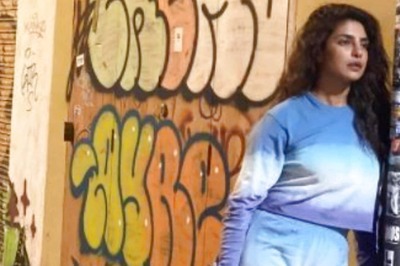
views
After months of protests and baseless accusations, Rajput fringe outfits have finally got their answer directly from the Supreme Court. Sanjay Leela Bhansali's Padmaavat which was certified by CBFC after five modifications, several disclaimers and a title change, was banned by four states for 'hurting Rajput sentiments.' While the makers have repeatedly denied belittling Rajput pride and maintained that the film celebrates their valor, the protests by the fringe outfits never actually died down.
Finally, the makers decided to knock on the doors of Supreme Court for a legal hearing and the unethical banning of the film in four states despite CBFC clearance. The SC ruled in favor of the makers asserting that “Creative freedom, freedom of speech and expression can’t be guillotined... artistic freedom has to be protected."
Interestingly, in a country as diverse as India, this isn't the first time a film has been banned in certain states and later cleared either by the Supreme Court or by the government itself. Here are a few other examples:
-Tamas
Govind Nihalani's Tamas, set in the backdrop of riot-stricken Pakistan at the time of Partition of Punjab in 1947, dealt with the plight of emigrant Sikh and Hindu families as a consequence of the partition. The film was aired as a television series on Doordarshan and upon release, stirred a lot of controversies. The Hyderabad office of Doordarshan was attacked and Nihalani was placed under police protection for a period of eight weeks after receiving death threats. On January 21, 1988, the Bombay High Court issued a stay to prevent the further screening of the series after hearing a petition from the city-based businessman Javed Siddiqui who in his plea stated that the serial "would poison the minds of the people".

However two days later, the court overruled the stay in favour of the series stating that it treated the "fundamentalists" in both communities equally. The juries further added "The message is loud and clear [...] directed as it is against the sickness of communalism, the extremists stand exposed when realisation dawns on both communities who ultimately unite as brothers." The series was later released in theatres as a four-hour-long feature film.
-Bandit Queen
Another film with a very similar fate to Padmaavat was Shekar Kapur's Bandit Queen. From its explicit language to Seema Biswas' nude scene and gory content, the film ran into various controversies. There came a time when the subject of the film, Phoolan Devi, herself objected to the filmmaking and her life's portrayal in the film.
She filed a petition to ban the film which was entertained by the High Court but later, the decision was revoked by Supreme Court as it said, "We think that the High Court ought not to have entertained the 1st respondent’s writ petition impugning the grant of the certificate based as it was principally upon the slurs allegedly cast by the film on the Gujjar community. We find that the judgment under appeal does not take due note of the theme of the film and [...] so far as the Tribunal had permitted them, were in aid of the theme and intended not to arouse prurient or lascivious thoughts but revulsion against the perpetrators and pity for the victim."
-Jodha Akhbar
Ashutosh Gowariker's popular film based on the love story of Mughal ruler Akhbar and Jodha Bai also faced its share of Rajput wrath during its release in 2008. The portrayal of ethnic Rajput people in the movie was criticized by members of the Rajput community as misleading, politically motivated historical revisionism that minimized Rajput history. Just like Padmaavat, the protests led to the film being banned in the states of Uttar Pradesh, Rajasthan, Haryana, and Uttarakhand. However, the producers went to the Supreme Court to challenge the decision, and the SC lifted the ban.
- Aarakshan
Prakash Jha's controversial film Aarakshan also faced the same problem as Padmaavat. The film is a socio-political drama based on the controversial policy of caste based reservations in Indian government jobs and educational institutions. Starring Saif Ali Khan, Deepika Padukone and Amitabh Bachchan in key roles, the film faced protests from Dalit community who objected to Saif being cast in the role of Dalit, citing his royal background and saw it as an insult to the community. The film was banned in Uttar Pradesh, Punjab and Andhra Pradesh before its theatrical release. National Commission for Scheduled Castes (NCSC) viewed the movie after receiving complaints of objectionable content. "While the overall theme of the film is not objectionable, it is loaded with anti-Dalit and anti-reservation dialogues," said NCSC chairman P.L. Punia.
However, the Board, which granted the film a U/A certification, defended Jha's right to free expression. In reply to this, the director decided to remove 'objectionable' scenes from the film in a bid to prevent further backlash. Later, the ban was lifted from the states when Jha and the producers appealed to the Supreme Court.
-Aandhi
Directed by Gulzar and featuring Suchitra Sen and Sanjeev Kumar in lead roles, Aandhi was supposedly based on the life of former Prime Minister Indira Gandhi. The film faced the wrath of the government during Emergency (1975) and its release was banned. However, the ban was lifted when Janta Dal came to power in 1977 post Indira Gandhi's defeat. Aandhi was played on the state-run television channel as well.
-Aaja Nachle
Madhuri Dixit's comeback film Aja Nachle saw its share of protest with the title song and the use of word 'mochi' and 'sunar'. The film was banned in Uttar Pradesh, Haryana, and Punjab for offending the sentiments of the community and even the National Commission for Scheduled Castes issued summons against the filmmaker. However, everything died down when the makers agreed to delete the word from the song.
-Garam Hawa
MS Sathyu's much-acclaimed film Garam Hawa was held by CBFC for eight months, fearing communal unrest, but film's director persisted and showed it to government officials, leaders, and journalists. Finally, the film was released to both critical and commercial success. The film first opened at two theaters Sagar and Sangeeth in Bangalore. A positive response at these theaters paved way for a subsequent nationwide release. Shiv Sena chief, the late Bal Thackeray, had threatened to burn down the cinema prior to film's Mumbai premiere, calling it 'pro-Muslim' and 'anti-India'.

On the day of the premiere, Thackeray was persuaded to attend a special screening of the film in the afternoon and thus allowed the film to be screened. Interestingly, the film went on to win National Award as the Best Feature Film on National Integration.

















Comments
0 comment